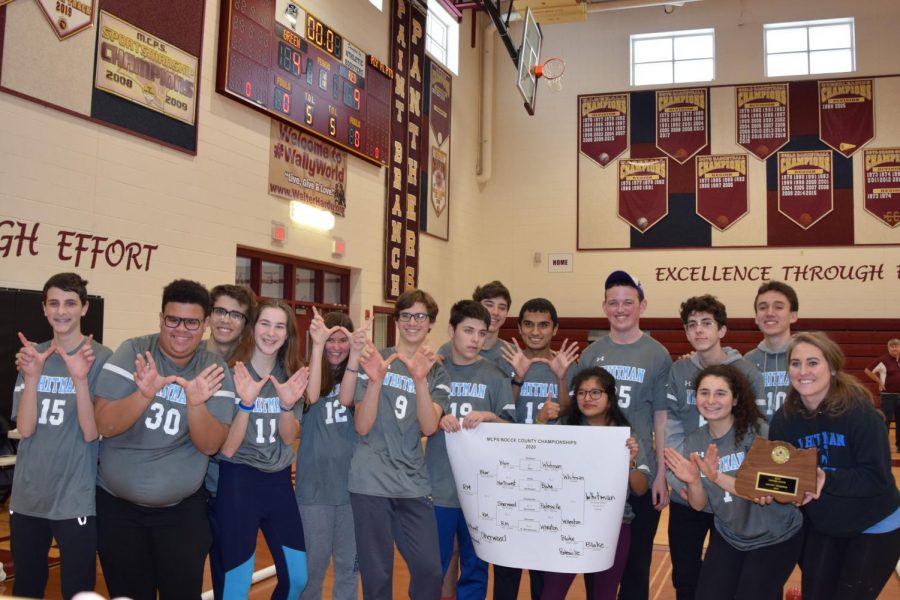MCPS: Reform corollary sports
Photo coutesry of Felix Leonhardt
Whitman’s bocce team poses for a photo after winning the bocce county championship.
June 16, 2020
I didn’t think it was possible, but the Whitman section of the bleachers began cheering even louder. We had finally done it. I locked eyes with my brother, Jonah, and we both cracked a smile. After a long, tiring season, we were the 2020 county champs. No, I don’t play soccer, basketball or baseball. I play bocce.
In fact, I play team handball, bocce and allied softball — Whitman’s three corollary sports. I love them. Corollary sports allow students with disabilities to play varsity sports alongside students without disabilities, giving all students an opportunity to represent their school on the field and on the court.
MCPS established its corollary sports program to comply with a 2008 Maryland law that mandates high schools give students with disabilities opportunities to participate in athletics. The sports teams do not have tryouts, do not make cuts and, according to MCPS, are ideally composed of an equal ratio of students with disabilities and students without disabilities.
While MCPS has done a wonderful job of promoting inclusivity in athletics — it is the only county in the country that recognizes corollary sports as varsity sports — there are still faults to the program. Team handball is hardly inclusive, many schools in the county do not even have corollary sports teams and students often age out of the program before they graduate. In order to improve equity in corollary sports and fulfill its goal of increased opportunities for students with disabilities, MCPS must fix these problems.
Replace team handball
Team handball, the fall corollary sport, is the least accessible to students with disabilities. Unlike bocce and softball, the game atmosphere is intense and rewards physical strength and speed. Many players also compete in other sports, like basketball and baseball.
“Handball is, unless you like to run, impossible to play,” said former Bethesda-Chevy Chase bocce player Izzy Kessler.
Running isn’t the only barrier handball presents to students with disabilities; players often collide with each other at full speed during practices and games. Without sharp motor skills, agility and quickness — all of which can be difficult for students with disabilities — injuries can happen more frequently.
Many students who participate in corollary bocce and softball are also in the county’s Learning for Independence program, which aims to prepare students with disabilities for the real world. However, a lot of these students don’t play handball because it is so limiting, said Whitman bocce and softball coach Brooke Supinski, who is also an LFI teacher. In many instances, parents are reluctant to let their child play handball, an allegedly accommodating sport, because they’re afraid their child will suffer an injury, Supinski said.
Fortunately, there are a number of possible solutions. For one, MCPS could hold an outdoor bocce season in the fall in addition to the existing indoor bocce season in the winter; bocce is the only corollary sport for which every high school in the county has a team. However, if the county wants to keep three different corollary sports, there are several other inclusive sports that have the potential to replace handball. For example, Carroll County high schools have cornhole and bowling teams — two sports that, like bocce and softball, are playable regardless of physical capability.
At the end of the day, any alternative to team handball that is accessible to all students would improve MCPS’s corollary sports program. In order to act on the values of inclusivity and accessibility around which MCPS built the corollary sports program, handball must go.
Improve awareness
Many schools struggle to field a corollary team for all three sports seasons. All 25 MCPS high schools have bocce teams, but only 15 have softball teams and only 10 have handball teams. To boost participation, MCPS should increase the amount of online information dedicated to corollary sports and issue a directive requiring all schools to include the three sports in P.E. and special education classes.
“It just takes encouragement and a bit of proactiveness from school administration, athletic directors and special education departments [to identify interested students],” MCPS bocce referee Lewis Kessler, Izzy’s father, said.
Additionally, while the MCPS website does have a page dedicated to corollary sports, the page is lacking content; it displays only the rulebook for each sport and a brief introduction to the rules of bocce.
“They could put a lot more information on the website, like photos and team pages, to get people excited,” Supinski said. “One of the reasons why people don’t play is they don’t know it exists.”
Too many schools are unable to field teams and too many students are unaware of the possibility of playing corollary sports. Raising awareness will go a long way in increasing participation and ensuring students at every high school can play a sport all three seasons.
Relax the age restriction
Many corollary sports athletes participate in programs like Whitman’s LFI program, which gives students with disabilities the option to stay in school until age 21. However, because MCPS recognizes corollary sports as varsity sports, students who turn 19 by Aug. 31 of the upcoming school year are unable to play.
While the rule aims to ensure the safety of players in highly physical sports, such as basketball and football, it also prevents many corollary sport athletes from playing a couple more years of a game they love at no danger to other students.
“Time and time again, we have seen parents say, ‘This is such a bittersweet year because this is the final roll of our child’s bocce career,’” Lewis said. “It doesn’t have to be, though, because they’re in school until 21.”
MCPS should take action to allow students older than 18 to play corollary sports by permitting athletic directors to make exceptions for students with disabilities. Currently, students who play non-corollary varsity sports must get permission from the school’s athletic director to play corollary sports. The county could implement a similar system for LFI students over the age of 18.
The age restriction should still exist; it gives corollary sports the same credibility as mainstream varsity sports while also preventing super athletic students without disabilities from dominating, Supinski said.
However, with exceptions for students with disabilities who are in school after they turn 18, MCPS would create the best of both worlds.
I love playing corollary sports. MCPS has done a wonderful job with the corollary sports program by creating teams that are inclusive, accommodating and fun. By making a few changes, MCPS can create vast improvements to an already successful program.
“We have a great thing going,” Lewis said. “It’s just about getting it even greater.”










